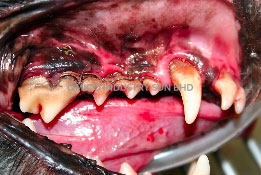Antioxidant protection*
Benefits to the Gums*A number of studies have shown that CoQ10 supports repair of gingival (gum) tissue. Gingival tissues in people with periodontal disease have been found deficient in CoQ10. In several doubleblind clinical trials, oral administration of CoQ10 has resulted in significant improvements. CoQ10 - Vitamins E’s Partner In vitro studies suggest CoQ10 in combination with vitamin E protects LDL cholesterol from oxidation more effectively than vitamin E alone. Protecting LDL from being oxidized by free radicals is a major factor in maintaining cardiovascular health.
Diverse Clinical BenefitsA number of research studies and clinical reports suggest a broad range of potential benefits from CoQ10 supplementation, stemming from its ability to support the heart and cardiovascular system, the immune system, cellular energy production, liver function, nerves, and muscles.
Recommended Usage of GUM-MAX:
|
WHAT IS PERIODONTAL DISEASE
WHAT IS CoQ10? Coenzyme Q10 (also known as ubiquinone) was discovered by Crane and his Colleagues in 1957 in beef heart mitochondria.[1] It was first isolated from the Mitochondria of bovine hearts in 1957 at the University of Wisconsin. Identification of the chemical structure and synthesis was completed by 1958. Because of its ubiquitous presence in nature and its quinone structure (similar to that of vitamin K), coenzyme Q10 is also known as ubiquinone. |
Clinical Studies on the use of GUM-MAX on animal:
Supplementing Cardiovascular for Dog

 CoQ10 is a versatile antioxidant.* The reduced form of CoQ10, ubiquinol-10, has been found to protect LDL against peroxidation by free radicals more effectively than vitamin E.* CoQ10 stabilizes membranes,* thus protecting them from free radical damage.In addition, studies have shown that CoQ10's potent free radical scavenging properties extend to brain tissue, where CoQ10 may protect neurons from the ravages of oxidative damage.Along with conferring protection to heart and brain tissues, CoQ10 has also been shown to enhance the levels of other antioxidant vitamins in the circulation, such as vitamins, A, C and E.
CoQ10 is a versatile antioxidant.* The reduced form of CoQ10, ubiquinol-10, has been found to protect LDL against peroxidation by free radicals more effectively than vitamin E.* CoQ10 stabilizes membranes,* thus protecting them from free radical damage.In addition, studies have shown that CoQ10's potent free radical scavenging properties extend to brain tissue, where CoQ10 may protect neurons from the ravages of oxidative damage.Along with conferring protection to heart and brain tissues, CoQ10 has also been shown to enhance the levels of other antioxidant vitamins in the circulation, such as vitamins, A, C and E. Periodontal disease is an inflammatory disease process resulting from the interaction of a bacterial attack and host inflammatory response. Arrays of molecules are considered to mediate the inflammatory response at one time or another, among these are free radicals and reactive oxygen species (ROS). Periodontal pathogens can induce ROS overproduction and thus may cause collagen and periodontal cell breakdown. When ROS are scavenged by antioxidants, there can be a reduction of collagen degradation. Ubiquinol (reduced form coenzyme Q10) serves as an endogenous antioxidant which increases the concentration of CoQ10 in the diseased gingiva and effectively suppresses advanced periodontal inflammation.
Periodontal disease is an inflammatory disease process resulting from the interaction of a bacterial attack and host inflammatory response. Arrays of molecules are considered to mediate the inflammatory response at one time or another, among these are free radicals and reactive oxygen species (ROS). Periodontal pathogens can induce ROS overproduction and thus may cause collagen and periodontal cell breakdown. When ROS are scavenged by antioxidants, there can be a reduction of collagen degradation. Ubiquinol (reduced form coenzyme Q10) serves as an endogenous antioxidant which increases the concentration of CoQ10 in the diseased gingiva and effectively suppresses advanced periodontal inflammation.
